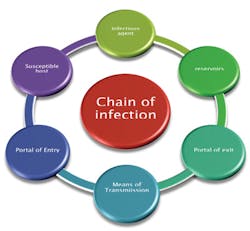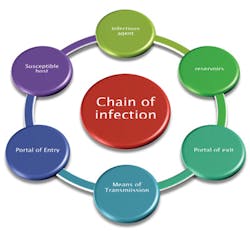Dental infection control: Fatigue leads to mistakes
BY NOEL KELSCH, RDHAP
Are you sick and tired of being sick and tired? There are many things in the chain of infection control that we have little power to control. There is one area you can have an impact on — sleep. We create a susceptible host when we deprive ourselves of sleep. Sleep has a direct impact on our immune system and thus our ability to fight off disease. Recent findings have shown that lack of sleep can even contribute to the ineffectiveness of vaccines, the most effective first line of defense against disease.1
The subject of sleep deprivation and its relationship to disease is a subject to which all health-care professionals should pay attention. Studies have shown that the lack of quality sleep or not enough sleep can be a factor in someone becoming sick after exposure to a virus, such as the common cold. A lack of sleep can also affect how fast someone recovers from that virus.
So just what does sleep have to do with anything? During sleep our immune system releases a vital protein called cytokines. Cytokines or natural killer cells help promote sleep, but they’re also a vital part of the immune system. They increase when someone is under stress, has an infection, or is dealing with the inflammatory process.
Studies show that lack of sleep decreases the production of cytokines. During times that someone is not getting enough sleep, they don’t produce the antibodies that fight off infection. In fact, even modest sleep disturbances can have an impact on this.2 Studies have shown a link between long-term lack of sleep and brittle diabetes, cardiovascular disease, and even obesity.3
An interesting study from the University of Pittsburgh suggests that a lack of sleep may also limit the effectiveness of vaccines. This study looked at adults who had less than six hours of sleep a night and were administered the Hepatitis B vaccine. It found that adults who had the hepatitis B vaccine but did not get more than six hours of sleep were less likely to be adequately protected against the illness. Sleeping fewer than six hours increased the risk of being unprotected, as compared with sleeping more than seven hours per night (11.5 times!).
So what do we all need to change?
The U.S. Centers for Disease Control and Prevention reports that 30%, or 40.6 million people, are not getting the seven to nine hours of sleep they need. That means that three out of 10 people have made themselves susceptible to diseases associated with sleep deprivation, including breast cancer, heart attack, stroke, diabetes, weight gain, viruses, depression, mood disorders, and more. As you sit at that computer screen or work through the night, you’re creating an atmosphere of disease. Your sleep needs to be valued as much as your waking hours. Sleep helps to rejuvenate cells and allows time for the immune system to function fully.
The symptoms of being sleep deprived are: tiredness, irritability, edginess, inability to tolerate stress, problems with concentration and memory, behavioral, learning or social problems, frequent infections, blurred vision, vague discomfort, alterations in appetite, and activity intolerance.4
So what can you do to change your habits? Harvard Medical School Collaboration has a non-profit branch that maintains a website filled with answers to medical questions. Any subject can be researched there, and it has proven to be a very reliable source of information you can share with your patients.
The website is dedicated to Morgan Leslie Segal, whose tragic suicide might have been prevented if she’d had access to better information. The section on sleep (www.helpguide.org/life/sleep_tips.htm) has great suggestions for sleeping in a healthy manner for the correct amount of time.
In infection control we need to work on the things we can control. Sleep has a major impact on our immune system, and it is one of the areas we can choose to improve, thus improving infection control. RDH
References
1. Breus M. Sleep Affects the Power of Vaccines: Research indicates good sleep helps the immune system Sept. 4, 2012
2. Irwin M, Mascovish A, Gilun JC, et al. Partial Sleep Deprivation Reduces Natural Killer Cell Activity in Humans, PHD Psychosomatic Medicine Nov. 1, 1994 vol. 56 no. 6 493-498
3. Vgontzas AN, Papanicolaou DA, Bixler EO, et al. Elevation of Plasma Cytokines in Disorders of Excessive Daytime Sleepiness: Role of Sleep Disturbance and Obesity JCEM 1997 82: 1313-1316; doi:10.1210/jc.82.5.1313
4. Opstad PK; Ekanger R; Nummestad M; Raabe N. Performance, mood, and clinical symptoms in men exposed to prolonged, severe physical work and sleep deprivation. Aviation, Space, and Environmental Medicine, Vol 49, Sept 1978, 1065-1073.
NOEL BRANDON KELSCH, RDHAP, is a syndicated columnist, writer, speaker, and cartoonist. She serves on the editorial review committee for the Organization for Safety, Asepsis and Prevention newsletter and has received many national awards. Kelsch owns her dental hygiene practice that focuses on access to care for all and helps facilitate the Simi Valley Free Dental Clinic. She has devoted much of her 35 years in dentistry to educating people about the devastating effects of methamphetamines and drug use. She is a past president of the California Dental Hygienists’ Association.
Past RDH Issues

